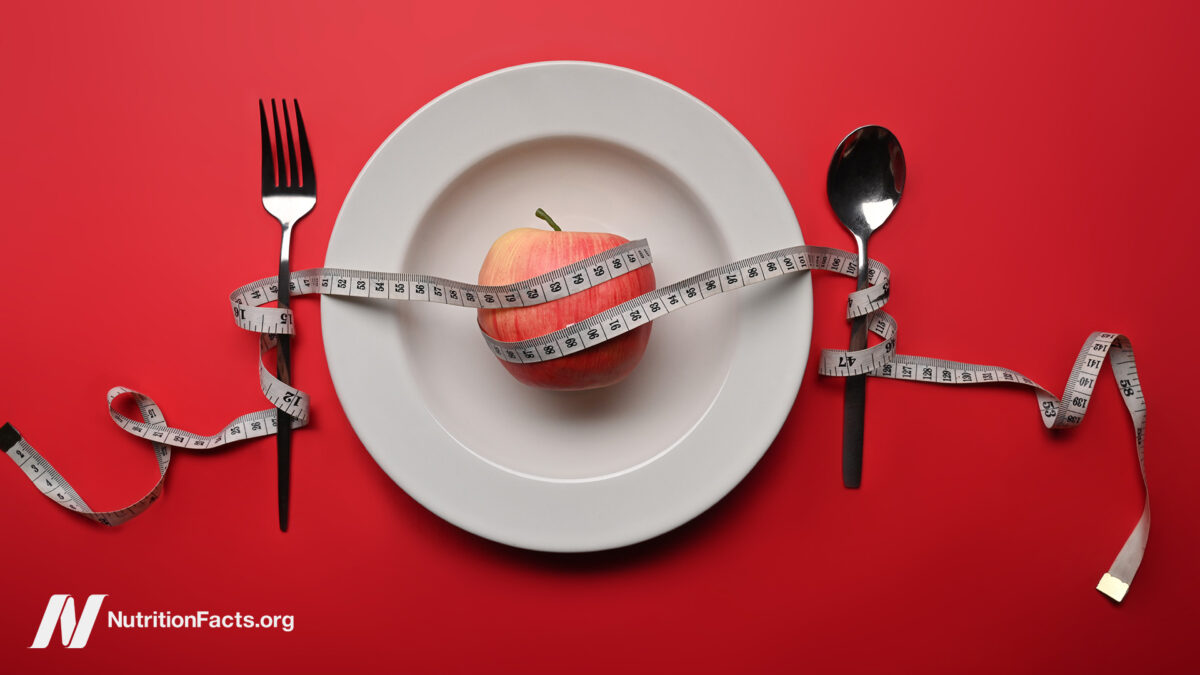
Might the appetite-suppressing effects of ketosis improve dietary compliance?
The new data are said to debunk “some, if not all, of the popular claims made for extreme carbohydrate restriction,” but what about ketones suppressing hunger? In a tightly controlled metabolic ward study where the ketogenic diet made things worse, everyone ate the same number of calories, but those on a keto diet lost less body fat. But, out in the real world, all of those ketones might spoil your appetite enough that you’d end up eating significantly less overall. On a low-carb diet, people end up storing 300 more calories of fat every day. Outside of the laboratory, though, if you were in a state of ketosis, might you be able to offset that if you were able to sustainably eat significantly less?
Paradoxically, as I discuss in my video Is Weight Loss on Ketosis Sustainable?, people may experience less hunger on a total fast compared to an extremely low-calorie diet. This may be thanks to ketones. In this state of ketosis, when you have high levels of ketones in your bloodstream, your hunger is dampened. How do we know it’s the ketones? If you inject ketones straight into people’s veins, even those who are not fasting lose their appetite, sometimes even to the point of getting nauseated and vomiting. So, ketones can explain why you might feel hungrier after a few days on a low-calorie diet than on a total zero-calorie diet—that is, a fast.
Can we then exploit the appetite-suppressing effects of ketosis by eating a ketogenic diet? If you ate so few carbs to sustain brain function, couldn’t you trick your body into thinking you’re fasting and get your liver to start pumping out ketones? Yes, but is it safe? Is it effective?
As you can see below and at 1:58 in my video, a meta-analysis of 48 randomized trials of various branded diets found that those advised to eat low-carb diets and those told to eat low-fat ones lost nearly identical amounts of weight after a year.
Obviously, high attrition rates and poor dietary adherence complicate comparisons of efficacy. The study participants weren’t actually put on those diets; they were just told to eat in those ways. Nevertheless, you can see how even just moving in each respective direction can get rid of a lot of CRAP (which is Jeff Novick’s acronym for Calorie-Rich And Processed foods). After all, as you can see in the graph below and at 2:37 in my video, the four largest calorie contributors in the American diet are refined grains, added fats, meat, and added sugars.
 Low-carb diets cut down on refined grains and added sugars, and low-fat diets tend to cut down on added fats and meat, so they both tell people to cut down on donuts. Any diet that does that already has a leg up. I figure a don’t-eat-anything-that-starts-with-the-letter-D diet could also successfully cause weight loss if it caused people to cut down on donuts, danishes, and Doritos, even if it makes no nutritional sense to exclude something like dill.
Low-carb diets cut down on refined grains and added sugars, and low-fat diets tend to cut down on added fats and meat, so they both tell people to cut down on donuts. Any diet that does that already has a leg up. I figure a don’t-eat-anything-that-starts-with-the-letter-D diet could also successfully cause weight loss if it caused people to cut down on donuts, danishes, and Doritos, even if it makes no nutritional sense to exclude something like dill.
The secret to long-term weight-loss success on any diet is compliance. Diet adherence is difficult, though, because any time you try to cut calories, your body ramps up your appetite to try to compensate. This is why traditional weight-loss approaches, like portion control, tend to fail. For long-term success, measured not in weeks or months but in years and decades, this day-to-day hunger problem must be overcome. On a wholesome plant-based diet, this can be accomplished thanks in part to calorie density because you’re just eating so much food. On a ketogenic diet, it may be accomplished with ketosis. In a systematic review and meta-analysis entitled “Do Ketogenic Diets Really Suppress Appetite,” researchers found that the answer was yes. Ketogenic diets also offer the unique advantage of being able to track dietary compliance in real-time with ketone test strips you can pee on to see if you’re still in ketosis. There’s no pee stick that will tell you if you’re eating enough fruits and veggies. All you have is the bathroom scale.
Keto compliance may be more in theory than practice, though. Even in studies where ketogenic diets are being used to control seizures, dietary compliance may drop below 50 percent after a few months. This can be tragic for those with intractable epilepsy, but for everyone else, the difficulty in sticking long-term to ketogenic diets may actually be a lifesaver. I’ll talk about keto diet safety next.
The keto diet is in contrast to a diet that would actually be healthful to stick to. See, for example, my video series on the CHIP program here.
This was the fourth video in a seven-part series on keto diets. If you haven’t yet, be sure to watch the others listed in the related videos below.






